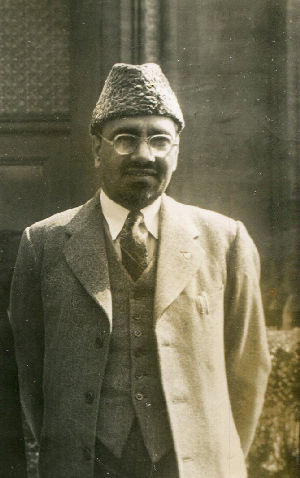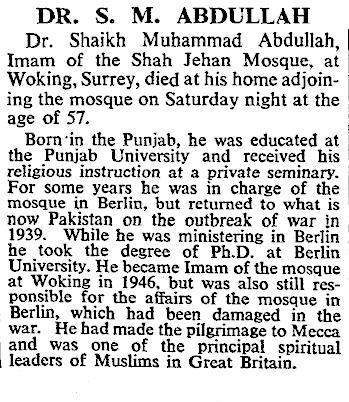| Home |
| History |
| Personalities
Dr Shaikh Muhammad Abdullah |
| Work |
| Photographic archive |
| Film newsreel archive |
| •
Contact us • Search the website |
Dr Shaikh Muhammad Abdullah (1898 –1956)Imam of the Woking Mosque, 1946–1956Imam of the Berlin Mosque, 1928–1939
Dr S.M. Abdullah, outside the Woking Mosque, 6 May 1951 More photographs of Dr Abdullah are here: link 1 • link 2 • link 3 British Pathe newsreel from 3 June 1954 showing Dr Abdullah leading Eid prayers The following obituary of Dr. Abdullah appeared in The Islamic Review, September 1956, on p. 37. The sudden and tragic death in May last of Dr. S M. Abdullah, Imam of the Shah Jehan Mosque, Woking, was flashed throughout the world by many a news agency and radio station, and hit newspaper headlines in Britain, Pakistan, India, and most of the Muslim countries. The full story, however yet remains to be recorded and preserved to serve as an inspiration to posterity, especially those to whom it may be given to make the dissemination of the light of Islam their life mission. And no journal better deserves this honour and privilege than this organ of the Woking Muslim Mission and Literary Trust, Woking, which Dr. Abdullah served so well and so long, and in whose service he actually laid down his life. Those who had the opportunity to come into contact with Dr. S. M. Abdullah could not miss one outstanding feature of his personality. He was out and out a man of faith. Faith in God was the sheet-anchor of his life, the keynote of his personality. And that made him what he was — a man of deep devotion with an unshakable faith in the destiny of Islam. If his devotion was excelled by any other of his qualities, it was his unassuming humility, transparent candour and human touch in all his dealings. As to his integrity, the difference of a few pence in the Mission accounts gave him sleepless nights, and he knew no peace of mind until the account had been adjusted. Besides scrupulous observance of all the imperative dictates of the Shari‘ah, he never missed the voluntary devotional practice of Tahajjud prayer in small hours of the night. Indeed, there lay the main source from which he drew aspiration and strength to maintain the high standards of personal conduct associated with the life of a missionary of Islam. He was not the kind of missionary who considers his job done when he has delivered a sermon. He lived what he preached. It was this kind of truly Islamic life which won Dr. Abdullah the esteem and respect of a very wide circle, both in Britain and his home country. Born in a Village, Rasoolnagar, in the Province of the former Punjab, in 1898, Dr. S. M. Abdullah received his early education in Sialkot. University education brought him to Lahore, the provincial capital, and intellectual and religious nerve-centre of the Muslims of the then Northern India. Here he came into impact with a religious luminary, the Maulana Muhammad Ali, and the virile Islamic movement under his leadership which was capturing the minds of the Muslim intelligentsia. A man of his devout cast of mind could not remain unaffected, and he threw in his lot with that movement. This imparted his personality the leaven which in the fullness of time made him renounce his all in the cause of Islam.[1] After taking his M.Sc. degree from the University of the Punjab, Dr. S. M. Abdullah took a government job as an industrial surveyor, but since frequent touring interfered with his religious studies under the tutorship of the Maulana Muhammad Ali, he resigned after a year, and joined the staff of the Lahore Islamia College as a Lecturer in Physics, in order to be able to satisfy his passion for religious quest. Even this job he quitted after four years when a call came to him to take charge of the Muslim Mission at Berlin, which had been set up only a few years earlier. Incidentally, it was during his stay at Berlin that he acquired from the University of Berlin the academical distinction — Ph.D. in chemistry. He worked as the Imam of the Berlin Mosque for full ten years (1928–39) when, owing to the outbreak of World War II, it became impossible for him to stay in Hitler’s Germany, India at the time being a British dependency and, as such, supposed to be a country at war with the Axis Powers. On his return home he was entrusted with the duties of the organization’s Secretary-Genera1,[2] which office he filled with distinction till 1946, when he was called upon to assume charge of the Woking Muslim Mission and Literary Trust. He devoted another ten years of his life to the service of this Mission when his life was cut short, and on 19th May 1956 his numerous friends and admirers were shocked to hear that the heart trouble which he had developed owing to over-straining himself in the service of the Mission took a sudden turn for the worse one evening, and within a few hours put out the light that kept burning in the Shah Jehan Mosque for ten long years. And there in the quiet loneliness of the Brookwood Cemetery, lies buried that indefatigable servant of Islam, thousands of miles away from his hearth and home. Dr. S. M. Abdullah is no more, but by the way he faced life and death, in a good and noble cause, he has blazed a path for all those who have faith in Islam as a destiny and hope of mankind, to come forward and keep the torch of Islam burning. Dr. Abdullah leaves a widow, one daughter and three sons. Footnotes to the above obituary by this website: [1] The movement under the leadership of Maulana Muhammad Ali, mentioned here, is the Ahmadiyya Anjuman Isha‘at Islam Lahore, or the Lahore Ahmadiyya Movement. [2] He was General-Secretary of the Ahmadiyya Anjuman Isha‘at Islam Lahore. Shown below is the image of the obituary of Dr Abdullah which was published in The Times, London, dated 21 May 1956 on page 10.
For Dr Abdullah’s reports from the Berlin Mosque and Mission during the 1930s, please visit this link of our Berlin website. |
the successor of the Woking Muslim Mission.

